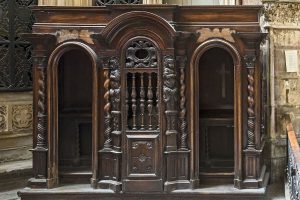CNA, CBJ—In recent years, some Catholics have been concerned by pushes from governments in locations such as Louisiana and Australia, and now California, who challenge the secrecy of the sacrament of confession, asking that priests betray the solemnity of penitents’ confessions when they hear of serious crimes in the confessional.
However, the words of Saint Pope Paul II the Great echo in our ears: BE NOT AFRAID. Keeping the secrecy of the sacrament of confession is one of the most important promises priests make.
The code of canon law states that “the sacramental seal is inviolable; therefore it is absolutely forbidden for a confessor to betray in any way a penitent in words or in any manner and for any reason.”
Priests who violate this seal of confession are automatically excommunicated.
Here are four priests—later declared saints after rigorous Vatican evaluation and confirmed miracles—who died protecting the sacred seal of confession. They are witnesses to the extreme lengths to which priests are willing to go to protect an integral part of their priestly vocation.
St. John Nepomucene
Born in Bohemia, or what is now the Czech Republic, between 1340 and 1350, St. John Nepomucene was an example of the protection of sacramental secrecy, being the first martyr who preferred to die rather than reveal the secret of confession.
When he was Vicar General of the Archdiocese of Prague, the now- saint servedas confessor of Sofia of Bavaria, the wife of King Wenceslaus. The king, who had infamous outbursts of anger and jealousy, ordered the priest to reveal the sins of his wife. The saint’s refusal infuriated Wenceslaus, who threatened to kill the priest if he did not tell him his wife’s secrets.
King Wenceslaus and John Nepomucene came into conflict again when the monarch wanted to seize a convent in order to take its wealth and give it to a relative. The saint prohibited its seizure because those goods belonged to the Church.
Filled with rage, the king ordered the torture of the saint, whose body was then thrown to the Vltava River in 1393.
St. Mateo Correa Magallanes
Saint Mateo Correa Magallanes was another martyr of the seal of confession. He was shot in Mexico during the Cristero War for refusing to reveal the confessions of prisoners rebelling against the Mexican government.
He was born in Tepechitlán in the state of Zacateca on July 22, 1866 and was ordained a priest in 1893. Fr. Matteo served as chaplain in various towns and parishes and was a member of the Knights of Columbus.
In 1927, the priest was arrested by Mexican army forces under General Eulogio Ortiz. A few days later, the general sent Father Correa to hear the confessions group of people who were to be shot. After Fr. Mateo finished administering the sacrament, the general then demanded that the priest reveal what he had heard.
Fr. Mateo responded with a resounding “no” and was executed. Currently, his remains are venerated in the Cathedral of Durango.
He was beatified Nov. 22, 1992 and canonized by St. John Paul II May 21, 2000.
Fr. Felipe Císcar Puig
Fr. Felipe Císcar Puig was a Valencian priest who is also also considered a martyr of the sacramental seal because he was martyred after keeping confessions secret during the religious persecution of the Spanish Civil War.
During the war, revolutionary and republican forces engaged in violent battles for power, and many Catholics were targeted. This was especially true of the coastal province of Valencia, on the Mediterranean sea.
The Archdiocese of Valencia indicated that, according to the documents collected, Father Císcar was taken to a prison near the end of August 1936. There, a Franciscan friar named Andrés Ivars asked that Fr. Císcar hear his confession before the friar was executed be firing squad.
“After the confession, they tried to extract its contents and before his refusal to reveal it, the militiamen threatened to kill him,” says an archdiocesan statement by a witness to the event. The priest then replied, “Do what you want but I will not reveal the confession, I would die before that.”
“Seeing him so sure, they took him to a sham court where he was ordered to reveal the secrets.” Fr. Císar remained committed to his position, stating that he preferred to die, and the militiamen condemned him to death. Fathers Felipe Císcar and Andrés Ivars were taken by car to another location where they were shot on September 8, 1936. They were 71 and 51 years old, respectively.
Both Felipe Císcar and Andrés Ivars are part of the canonization cause of Ricardo Pelufo Esteve and 43 companions.
Fr. Fernando Olmedo Reguera
Fr. Fernando Olmedo Reguera was also a victim of the Spanish Civil War who opted to die rather than break the secrecy of confession.
Born in Santiago de Compostela Jan. 10, 1873 and ordained a priest in the Capuchin Order of Friars Minor on July 31, 1904, Fr. Olmedo was killed Aug. 12, 1936. He served the order as its provincial secretary until 1936, when he had to leave his convent due to the severe religious persecution in the area.
Fr. Olmedo was then arrested, and beaten in prison. He then was pressured into revealing the confessions of others, but Fr. Olmedo did not give in. According to reports, he was shot at a 19th century fortress outside of Madrid by a populist tribunal. His remains are entombed in the crypt of the Church of Jesus of Medinaceli in Madrid, and he was beatified in Tarragona Oct. 13, 2013.
RELATED RESOURCES:
- article on CA law
- another article



You must be logged in to post a comment.